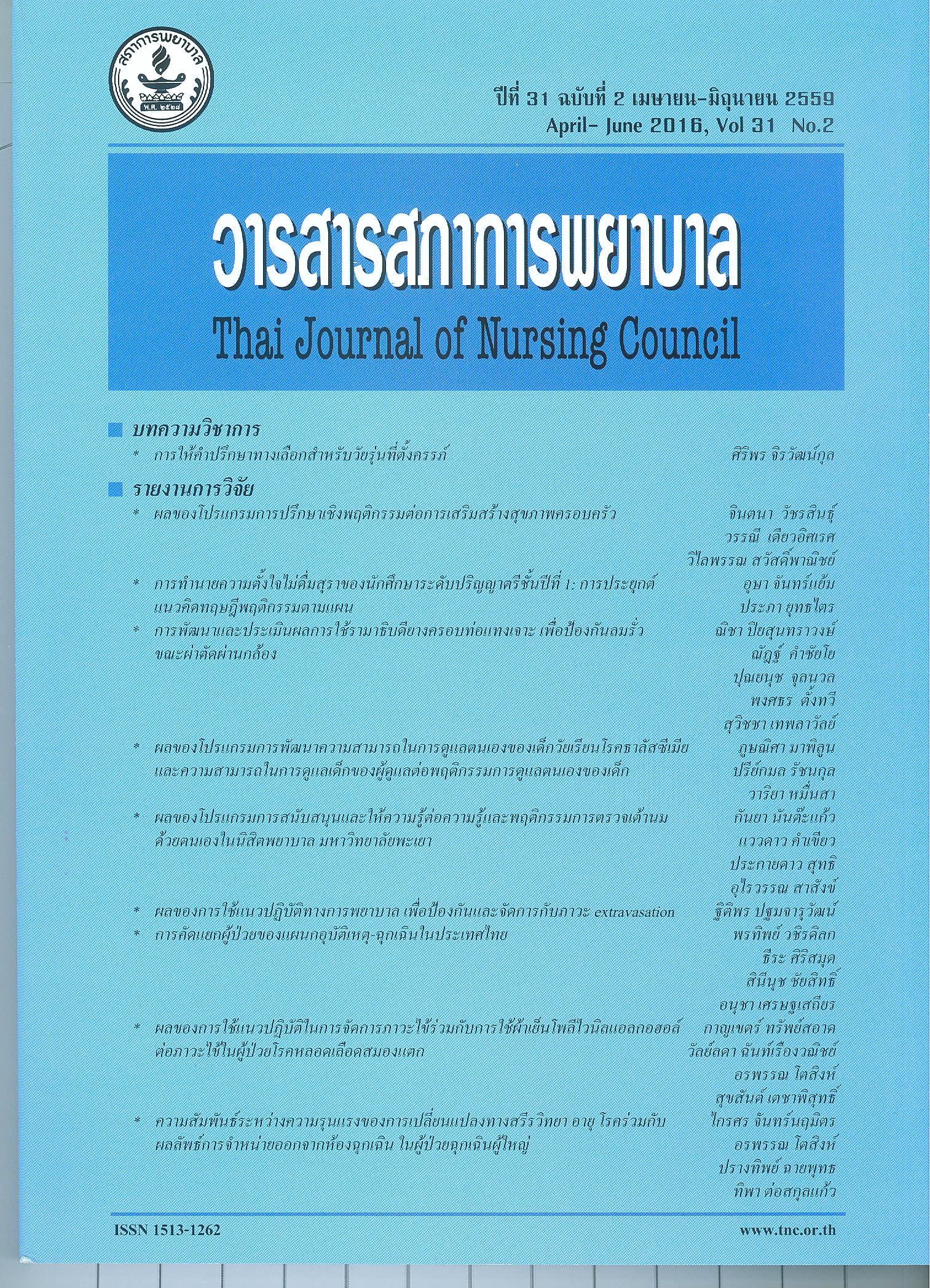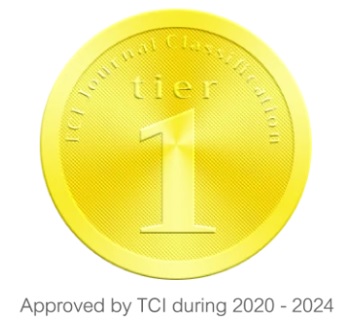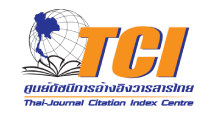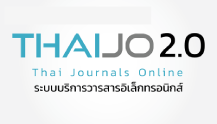ผลของโปรแกรมการปรึกษาเชิงพฤติกรรมต่อการเสริมสร้างสุขภาพครอบครัว
Keywords:
ครอบครัว การปรึกษาเชิงพฤติกรรม การเสริมสร้างสุขภาพ, behavioural consultation, family health developmentAbstract
วัตถุประสงค์การวิจัย: เพื่อทดสอบประสิทธิผลของการใช้โปรแกรมฯต่อพฤติกรรมการสร้างเสริมสุขภาพครอบครัว
การออกแบบการวิจัย: การศึกษาวิจัยกึ่งทดลอง กลุ่มเดียงวัดก่อนและหลัง
วิธีดำเนินการวิจัย: กลุ่มตัวอย่างประกอบด้วยครอบครัวที่มีศักยภาพจำกัดในการสร้างเสริมสุขภาพครอบครัวทั้งระยะครอบครัวเริ่มต้น วัยก่อนเรียน วัยเรียน วัยรุ่น และวัยชรา จำนวน 55 ครอบครัว เลือกโดยการสุ่มอย่างง่ายจากครอบครัวที่อยู่ในเขตรับผิดชอบของโรงพยาบาลส่งเสริมสุขภาพตำบลบ้านสวน เขตเมืองชลบุรี เครื่องมือที่ใช้ในการวิจัยประกอบด้วยแบบบันทึกข้อมูลทั่วไป แบบสอบถามพฤติกรรมสุขภาพครอบครัว และโปรแกรมการปรึกษาเชิงพฤติกรรมครอบครัว เก็บข้อมูลก่อนและหลังจากครอบครัวได้รับโปรแกรมฯ จำนวน 3 ครั้ง วิเคราะห์ความแตกต่างค่าเฉลี่ยพฤติกรรมสร้างเสริมสุขภาพก่อนและหลังการได้รับโปรแกรมฯ ด้วยสถิติที (pair t-test)
ผลการวิจัย: หลังจากได้รับโปรแกรมการปรึกษาเชิงพฤติกรรมครอบครัว ครอบครัวทุกระยะพัฒนาการมีคะแนนเฉลี่ยพฤติกรรมการสร้างเสริมสุขภาพครอบครัวสูงกว่าก่อนได้รับโปรแกรมการปรึกษาเชิงพฤติกรรมครอบครัวอย่างมีนัยสำคัญทางสถิติทึ่ระดับ .05
ข้อเสนอแนะ: พยาบาลหรือบุคคลากรทางสุขภาพที่จะนำโปรแกรมการปรึกษาเชิงพฤติกรรมครอบครัวนี้ไปใช้เพื่อการสร้างเสริมสุขภาพครอบครัว ควรปรับให้สอดคล้องกับบริบทของครอบครัวแต่ระยะพัฒนาการ;
Objectives: To test the impact that the behavioural consultation programme had on family health development.
Design: One-group experimental research with a pre-test and a post-test.
Implementation: This study was conducted on a simply randomised sample of 55 families that showed family health development potential. The study focused on 5 stages of family health development, namely, (1) the beginning stage; (2) the pre-schooling stage; (3) the schooling stage; (4) the adolescent stage; and (5) the elderly stage. The 55 families were in the care-zone of Baansuan Subdistrict Health Promotion Hospital in Chonburi province. The research instruments were (1) a general information form; (2) a family healthcare behaviour questionnaire; and (3) the family behaviour consultation programme. Data were collected 3 times before and 3 times after the subjects’ participation in the programme. The data were analysed using paired t-tests, to compare the subjects’ family health behaviour before and after treatment.
Results: After being treated with the behavioural consultation programme, all the families, at every stage of family health development, displayed a statistically significant improvement, at .05, in their family health behaviour.
Recommendations: It is suggested that nurses or healthcare personnel apply this consultation programme to promoting family health, with necessary adjustments based on each family’s developmental stage.
References
Wright LM, Leahey M. Nursing and Families: A Guide to Family Assessment and Intervention. (6th Ed). Philadelphia: F.A. Davis Company; 2013.
Denham S. Family Health: A Framework for Nursing. Philadelphia: F.A. Davis; 2005.
Bomar P. Nurses and Family Health Promotion: Concept, Assessment, and Intervention. Philadelphia: W.B. Saunders; 2006.
Office of Women’s Affairs and Family Development Ministry of Social Development and Human Security. Policy and Strategic Plan for Family Development 2003-2013; Bangkok: Thoanan Publispher (in Thai)
Yiangkulchao, W. Factors related to health promoting behaviors of families in the area of banchang health center Nakhon Si Thammarat province 2011. Available from: URL: http://www.vcharkarn.com
Kompayak, J., Praserttrong, C., Kasipol, T., Kaewnimitchai, N., Kijthorntham, W., & Samrarnchai, R. Factors related to health promotion behaviors of families in Chlongmahanak Community Pomprabsutrupai Region, Bangkok Metropolitan. Samut Prakan: Huachiew Chalermprakiat University 2001. (inThai)
Suwanpatikorn, K. Family Health Promotion Behaviors. Doctoral Dissertation of Public Health Nursing; Graduate School Mahidol University 2544.
Nursing Division. Guideline for Family Nursing. Bangkok: Office of the Permanent Secretary; 2545. (in Thai)
Pancharean, S. Factors influencing health promoting behaviors of menopausal women in Sawanpracharak Nakhonsawan Hospital Nakhonsawan Province. Thai Journal of Nursing Council 2009; 24(2): 78-87. (in Thai)
Christensen P. The health-promoting family: a conceptual framework for future research. Social Science & Medicine 2004; 59: 377–87.
Winitsorn, N., Wacharasin, C., Deoisres, W. The effects of behavioral counseling program on foot care behavior of patients with type 2 diabetes mellitus and their families. Journal of Faculty of Nursing, Burapha University, 2012; 20(3), 47-60. (in Thai).
Wacharasin, C., Phaktoop, M., Sananreungsak, S. (2015). A family empowerment program for families having children with Thalassemia, Thailand. Nursing & Health Sciences, 2015; 17(3):387-94. DOI: ๖๗
Wright LM, Bell JM. Beliefs and Illness: A Model for Healing. Calgary, Alberta, Canada: 4th Floor Press; 2009.
Sungklom, S., Wacharasin, C. Deoisres, W. The effects of program for changing belief among women and their spouses on self-Breast examination of women. Journal of Faculty of Nursing, Burapha University 2010; 18(Supplement): 60-71. (In Thai)
Petra, C., Wacharasin, C., Deoisres, W. Effects of changing belief program on belief and intention of having cervical screening among women. Journal of Faculty of Nursing, Burapha University 2009; 17(4): 71-84. (In Thai)
Bartholomew LK, Parcel GS, Kok G, Gottlieb NH, Femandez M. Planning health promotion programs: An intervention mapping approach. San Francisco: A Wiley Imprint; 2011.
Bandura A. Health Promotion by Social Cognitive Means. Health Education & Behavior 2004; 31: 143-164. DOI: 10.1177/1090198104263660
Nanna, P., Wacharasin, C., Deoisres, W. Effects of illness belief model program on suffering of hemodialysis patients and their families. Journal of Faculty of Nursing, Burapha University 2008; 16(2): 24-38. (In Thai)






